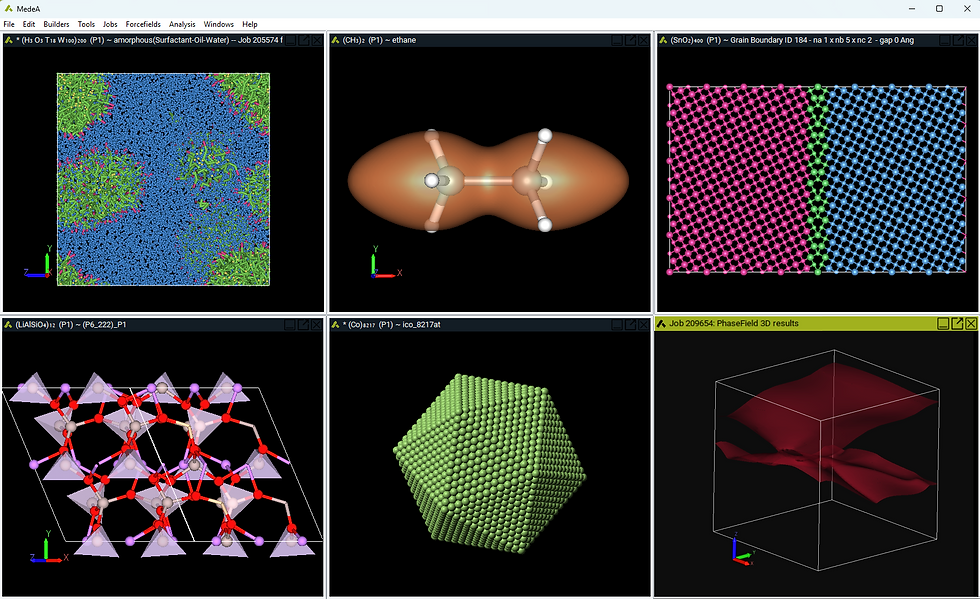UGM Webinar: Post-DFT Accuracy for Finite Temperature Properties Using Incremental Machine Learning
- Katherine Hollingsworth
- Oct 18, 2021
- 3 min read
Upcoming Webinar
Presented by Professor Georg Kresse
ABSTRACT
Accurate predictions of phase transition temperatures have always been a dream of materials physicists. However, calculations using first-principles methods are usually extremely time consuming and challenging, while force fields without extensive and careful tuning tend to provide inaccurate answers. Machine-learned force fields are an obvious solution to this dilemma, but training them can be a time-consuming and tedious process.
In this talk, I show that training on the fly leads to highly accurate machine-learned force fields (MLFF) that meet the challenges of predicting properties at finite temperatures with an accuracy close to the original first-principles methods. Our machine learning approach is based on Bayesian inference and uses a combination of radial and angular features computed locally for each atom. Bayesian regression not only provides predictions for the energies, forces, and stress tensor, but also predicts the uncertainty of these predictions. When the uncertainties exceed a certain threshold, on-the-fly first-principles calculations are performed, the structure is added to the training data set, and the MLFF is refined. Training is simply done by heating (or cooling) all phases of interest. Typically, an accurate force field can be obtained in a few days, and the training requires no special intervention or expertise by the user.
The accuracy of the approach is demonstrated for several materials, including the first-order displacing martensitic phase transition from hcp to bcc zirconium, zirconia with two phase transitions from monoclinic to tetragonal to cubic, melting temperatures of Al, Si, Ge, Sn, and MgO, and the phase transition temperatures of organic perovskites.
Finally, we show that the difference between different functionals or between density functional theory and the random phase approximations can be learned very efficiently. This allows us to simulate the phase transition temperatures of zirconia using correlated wave functional methods. The results are in almost perfect agreement with all available experimental data.
Live Webinar Dates
Wednesday, October 20th: 08:00 PDT (USA) 11:00 EDT (USA) 16:00 GMT (EUROPE) 17:00 CEST (EUROPE) 20:30 IST (INDIA) Join us after the presentation for a live Q&A session.
**A recording of the session will be available immediately after for anyone who registers.
Upcoming:
Other internationally renowned speakers at the User Group Meeting include:
Professor Sir Richard Catlow FRS (University College London, England)
Professor Michele Parrinello (Instituto Italiano di Tecnologia, Italy)
Professor Chris Van de Walle (University of California Santa Barbara, USA)

Professor Georg Kresse
Professor Georg Kresse received his doctoral degree from the Vienna University of Technology in 1993. After his habilitation at the Vienna University of Technology in 2001, he was offered a full professorship by both the University of Oxford and the University of Vienna. In 2007 he accepted the chair for Computational Quantum Mechanics in Vienna. Since 2011 Kresse is a full member of the Austrian Academy of Sciences and since 2012 of the International Academy of Quantum Molecular Sciences. He is the recipient of several awards, including the 2003 "START Grant" of the Austrian Science Fund (FWF), the "Hellmann Preis" of the Internationale Working group for Theoretical Chemistry, and the Kardinal-Innitzer-Preis in 2016.
His main research interests are Theoretical Solid State Physics, Surface Sciences and Computational Materials Physics. His work on ab initio density functional theory has shaped the application of density functional theory in materials sciences worldwide. Georg Kresse is the main author and developer of the computer program "VASP" (Vienna ab initio simulation package), which is the most widely used program for quantum mechanical simulations of solids and their surfaces. The three publications on the algorithms implemented in VASP have been cited between 40.000 and 65.000 times each and belong to the 100 most cited research articles ever published.
His current work focuses on the precise description of electron interactions in solids and real materials, encompassing modern many body theory, quantum Monte Carlo methods and machine learning. Georg Kresse is the author of more than 400 research articles. With a Web of Siences h-index of over 110 he is among the most cited physicists.






Comments